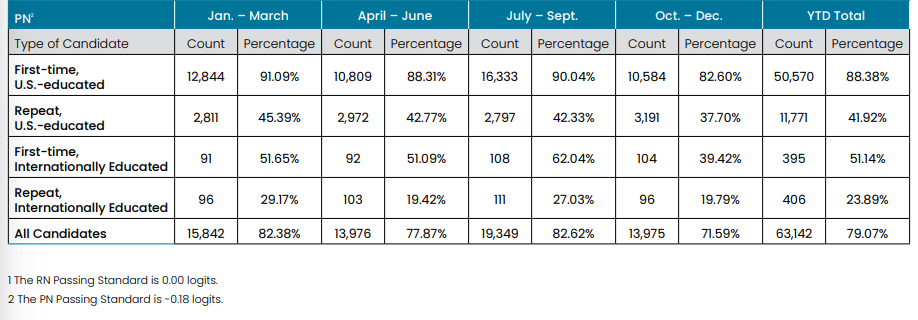Table of Contents
You’ve spent years studying hard in the nursing school and passed with flying colors. Now one final hurdle stands before you becoming a registered nurse is the NCLEX-RN exam. It doesn’t just test your skills but also how you think under pressure. So the question many aspiring nurses are left wondering is, “how hard is the NCLEX?”.
Well, the answer depends on your preparation, adaptability, and how well you understand the exam format. The pass rate of the exam is high enough to conclude that while it’s challenging, it’s far from impossible.
This blog will break down how hard this exam is and how a NCLEX prep course can be helpful. So let’s get straight into it.
How Hard is the NCLEX Exam?
Rather than answering the “how”, let’s just address the core question directly. Is the NCLEX exam hard? To be honest, yes, it’s designed to be challenging, and there are several reasons behind it. Like, Computerized Adaptive Testing (CAT) format, focus on application and analysis, and of course, the breadth of content.
What is the NCLEX Pass rate?
While the National Council Licensure Examination feels hard due to the factors above, the pass rate suggests otherwise.

(Source: NCSBN)
According to the data by NCSBN (National Council of State Boards of Nursing), the 2024 NCLEX pass rate is just around 79%. That includes first-time candidates, repeat candidates, first-timer IEN candidates, and repeat IENs.
While this number suggests a well-prepared candidate will succeed, underestimating the exam will be risky. The NCLEX is designed to be tough, but with a proper NCLEX study plan, you will pass the exam right away.
But what makes the NCLEX exam hard?
What Makes the NCLEX-RN Difficult?
The NCLEX is designed to be a rigorous test of nursing competency—not just knowledge, but the ability to think critically under pressure. While passing is achievable with proper preparation, several key factors contribute to its reputation as a challenging exam:
Computerized Adaptive Testing (CAT)
The exam adjusts question difficulty in real-time based on your performance. Answer correctly, and questions get harder. But miss one, and it may give you an easier one. But you’ll need more correct answers to pass. This unpredictability adds stress.
High-Stakes Pressure
Failing means waiting 45 days to retake it, paying another fee, and delaying your nursing career. This psychological pressure can affect performance.
Emphasis on Critical Thinking, Not Just Memorization
The NCLEX tests clinical judgment—you won’t just recall facts. Instead, you’ll analyze patient scenarios, prioritize care, and apply knowledge in complex situations.
Vague or “All Correct” Answer Choices
Some questions have multiple plausible answers, forcing you to choose the best one. Others may include “Select All That Apply” (SATA) questions, which are notoriously tricky.
Time and Mental Fatigue
The test can take up to 5 hours with up to 145 questions. Maintaining focus for that long—while processing complex scenarios—is exhausting.
Broad and Detailed Content Coverage
The NCLEX covers four major categories (Safe Care, Health Promotion, Psychosocial Integrity, Physiological Integrity) with subtopics ranging from pharmacology to maternity care. You must be well-rounded.
Tricky Question Phrasing
Questions often include distractors, double negatives, or require careful reading to avoid misinterpretation. One misread word can lead to a wrong answer.
Adaptive Scoring
The NCLEX evaluates competency standards through adaptive testing. There is partial grading–the difficulty level and the accuracy of your answers contribute collectively to your overall assessment.
This scoring method can heighten pressure as candidates may find it challenging to gauge their performance in real-time.
The “Shut-Off” Rule Creates Anxiety
The exam stops at 85 questions if you’re clearly passing or failing. But that will continue up to 150 if you’re borderline. Not knowing if you’re doing well can be nerve-wracking.
Unfamiliar Question Formats
From drag-and-drop to hotspot (clicking on an image), the NCLEX uses interactive formats that require practice—not just content knowledge.
However, with focused study, practice questions, and test-taking strategies, thousands pass every year.
How to Pass the NCLEX-RN With Flying Colors?
Passing the NCLEX isn’t just about hard work—it’s about smart preparation. Here’s how to maximize your chances of success, regardless of how hard NCLEX is.
Understand the NCLEX Basics
The exam follows the NCLEX-RN Test Plan (or NCLEX-PN for LPNs). It outlines four major client needs categories:
- Safe & Effective Care Environment
- Health Promotion & Maintenance
- Psychosocial Integrity
- Physiological Integrity
Master Test-taking Strategies
The NCLEX rewards critical thinking, not just memorization. Key tactics:
- Eliminate wrong answers first (Even if you’re unsure, narrowing choices boosts odds).
- Look for keywords (“Best,” “Most urgent,” “Priority”)—they dictate what the question really asks.
- Avoid overthinking—your first instinct is often correct.
Simulate Real Exam Conditions
Before taking the exam for real, try to simulate it with realistic conditions.
- Take full-length CAT practice tests (timed, no distractions).
- Build stamina by studying in 2-3 hour blocks (mimicking test duration).
- Review incorrect answers thoroughly—rationales teach more than correct ones.
Manage Test Day Like a Pro
Preparation is one thing; but come test day, you need to manage yourself like a pro.
- Sleep well before the exam (cramming hurts performance).
- Arrive early to avoid stress.
- Use the tutorial time to calm nerves (it doesn’t count against you).
- Pace yourself—aim for ~1 minute per question.
Stay calm, read carefully, and stick to your strategy. That’s how you ensure the NCLEX exam is not hard.
If you want to ensure the best results on your first attempt, get the best NCLEX prep program by FBNPC.
FAQs on How Hard FBNPC is
Q.1 Is the NCLEX harder than nursing school exams?
Yes, for most test-takers. See, nursing school tests often focus on memorization. But the NCLEX evaluates clinical judgment through complex, real-world scenarios. The adaptive format also makes it feel more unpredictable.
Q.2 How many questions do I need to get right to pass?
The NCLEX doesn’t use a percentage. Instead, it’s pass/fail based on competency thresholds. The test adapts until it’s 95% confident you’re above or below the standard.
Q.3 Does shutting off at 85 questions mean I passed?
Not necessarily. While it could mean you did well enough to pass early, it might also indicate a clear failure. The only way to know for sure is your official results.
Q.4 Can test anxiety make the NCLEX harder?
Absolutely. Anxiety clouds judgment—practice deep breathing techniques and simulate test conditions during prep.
Q.5 Why does the NCLEX feel so unpredictable?
The computerized adaptive testing (CAT) system constantly adjusts question difficulty based on your performance. There’s no fixed number of “hard” or “easy” questions – the exam tailors itself to your ability level in real-time.
So, How Hard is NCLEX?
The NCLEX is undeniably challenging—by design. It tests not just what you know, but how you navigate pressure. It involves adaptive format, high-stakes nature, and emphasis on clinical judgment. That is meant to separate prepared nurses from those who need more time.
As you may see from the NCSBN data, thousands of candidates pass the NCLEX every year, and you can too. What you need to do is study strategically, practice critical thinking, and manage your test-day nerves. That’s how NCLEX becomes less of a hurdle and more of a conquerable challenge.
And to take the NCLEX, pass with outstanding results, and become the best RN, enroll with FBNPC today!



